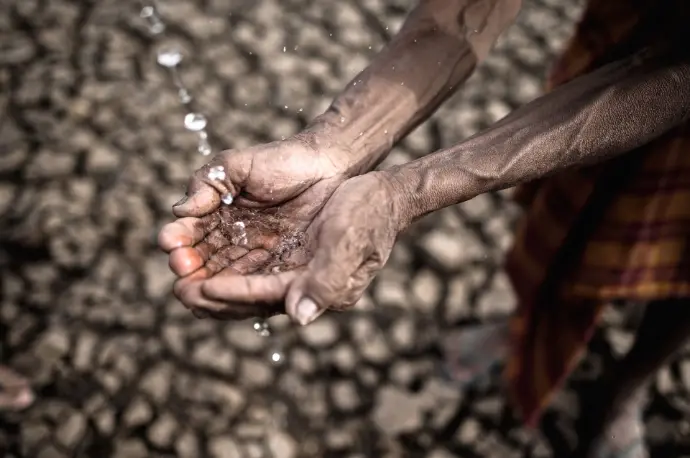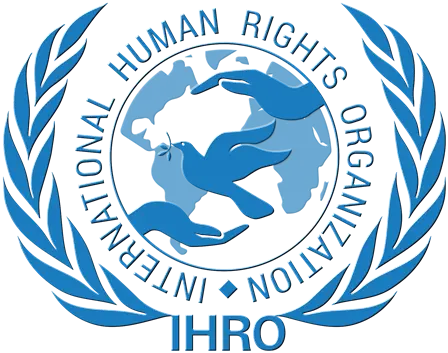The Future of Water: Water Rights and Challenges in an Increasingly Warming World
In our feature article entitled "The Future of Water: Water Rights and Conflicts in a Hotter World," we conducted a detailed study of water rights in a planet influenced by climate change. Prepare to delve into a comprehensive examination of the challenges facing access to water in the context of progressively rising global temperatures. Join us to discover how environmental rights and climate change directly impact people's lives!
In a planet where temperatures are constantly rising, water is no longer simply an essential resource for life and is beginning to become one of the greatest points of global tension. This vital resource is the subject of study, debate, and, unfortunately, conflict in many parts of the world. Climate change, population growth, and the overexploitation of water sources have highlighted a problem that leaves no one indifferent: who controls water and how it is used.
The growing scarcity of water not only entails obvious consequences for agriculture, industry, and human consumption, but also a rethinking of the rights related to its ownership and management. In some places, entire rivers are disappearing, weakened by prolonged droughts and mismanagement; in others, rainfall is unpredictable and devastating. In this context, the need to regulate and manage water rights has become a monumental challenge.
Conflicts arising from access to water have arisen not only between countries but also within them. Regions with limited resources struggle to maintain their reserves against external interests, while the most vulnerable communities are often left out of the discussion because they are the least represented in decision-making spaces. This raises a major question: how can equitable access to water be guaranteed?
However, beyond the problems, there are also opportunities to make a difference. Technological innovation in water collection and storage promises creative and inclusive solutions. On the other hand, more efficient and sustainable management can open up avenues to preserve this crucial resource without compromising ecosystem well-being.
The future of water is not completely determined, but it is clear that addressing it requires global collaboration, more inclusive policies, and a change in our relationship with this essential element of life. If we can prioritize these goals, perhaps we can turn this monumental challenge into an opportunity to build a more resilient and equitable world in the face of climate adversity.
Introduction
Water rights in a warming world are essential to ensuring equitable and sustainable access to this resource, which is essential for life. In a context of rising global temperatures, the conservation and equitable distribution of water becomes vital for the survival of communities worldwide.
The importance of water rights is based on their ability to ensure that all people, regardless of geographic location or socioeconomic status, have access to purified and safe water for their daily needs. Furthermore, water rights play a crucial role in safeguarding aquatic ecosystems, supporting biodiversity, and ensuring the long-term sustainability of water-related resources. It is essential to recognize that water rights are not limited solely to access to drinking water, but also encompass the active participation of communities in the decision-making process surrounding water use and management, fostering an inclusive and democratic approach to the conservation of this fundamental resource.
Climate change has had a considerable impact on water resources globally, leading to events such as prolonged droughts, devastating floods, and altered precipitation patterns. These effects have highlighted the vulnerability of aquatic ecosystems and the urgent need to address the challenges arising from the climate crisis.
Rising global temperatures have accelerated the melting of glaciers and the decline in water levels, directly affecting the availability of freshwater for human consumption, agriculture, and industry. This situation has intensified water scarcity in various regions, giving rise to tensions and disputes over access to this fundamental resource. Furthermore, climate change has worsened the salinization of freshwater sources, impacting water quality and jeopardizing its potability. These consequences emphasize the urgent need to implement adaptation and mitigation strategies to safeguard water resources from the effects of global warming.
Water management faces increasingly complex challenges in a world that continues to warm. Overexploitation of aquifers, contamination of water sources, and unequal access are just some of the problems that require immediate attention and comprehensive solutions.
Sustainable water management faces obstacles due to conflicts over use among different sectors, such as agriculture, industry, and urban supply. These disagreements are intensified by the impacts of climate change, which has increased uncertainty regarding the availability and distribution of water resources.
To address contemporary challenges in water management, it is essential to adopt comprehensive approaches that consider the preservation of aquatic ecosystems, optimization of water use, and equity in access to this invaluable resource. The implementation of effective policies and regulations, along with active community engagement, is crucial to ensuring water security in a global context increasingly impacted by climate change.

Current Status of Water Rights
The current status of water rights represents one of the most pressing issues on the global agenda. In the 21st century, access to water, considered a vital and irreplaceable resource, faces growing challenges due to population pressure, climate change, pollution, and inadequate management in many regions of the world. On the one hand, the right to water has been recognized as a fundamental human right by international organizations such as the UN. However, this recognition does not always translate into concrete actions to guarantee its fulfillment. Millions of people around the world continue to face significant barriers to accessing this resource, either due to a lack of adequate infrastructure or inequalities that prioritize industrial use over the basic needs of communities.
Climate change adds a layer of complexity to this problem. Extreme weather patterns, such as prolonged droughts or torrential rains, directly affect drinking water supplies and destabilize already fragile systems. This generates tensions between different sectors such as agriculture, industry, and human consumption, which often leads to conflicts over water use. Furthermore, the privatization and commodification of water has sparked intense debate. For some sectors, these measures are an efficient way to regulate and distribute the resource. However, critics argue that this commodification-based approach jeopardizes equitable access, especially for the most vulnerable populations.
Given this scenario, fundamental questions arise: how can we ensure that water is treated as a common good and not a luxury? What sustainable policies and solutions can be implemented to address this crisis? Addressing the current situation of water rights requires not only a local and targeted approach, but also coordinated global action that prioritizes sustainability and social justice. In this sense, governments, non-governmental organizations, and citizens must join forces to ensure that this vital resource remains accessible to all, preserving both its availability and quality for future generations. The conversation about water rights cannot wait; Every decision we make today will make a crucial difference in the years to come.
Water scarcity represents a growing global challenge. According to UNESCO, at least 2 billion people reside in nations experiencing water stress, posing considerable concerns for water security and public well-being. This insufficiency is exacerbated by the growing demand for water driven by population growth and industrial expansion, as well as by the impacts of climate change altering rainfall patterns.
Water scarcity not only impacts human populations but also has devastating effects on agriculture, biological diversity, and aquatic ecosystems. It is imperative to address this issue holistically, considering both human needs and the preservation of aquatic ecosystems.
Human rights and environmental activists play a fundamental role in raising awareness about water scarcity and promoting policies that ensure fair and sustainable access to water for all people, especially the most vulnerable communities.
Access to drinking water has become a source of conflict in various parts of the world. Communities are often forced to compete for scarce water resources, which can lead to tensions and disputes at the local, national, and even international levels.
Conflicts over water not only involve communities but can also arise between different sectors, such as agriculture, industry, and urban supply. These disputes underscore the need to develop policies and agreements that promote sustainable water management and the peaceful resolution of conflicts associated with its access and distribution.
Human rights defenders work tirelessly to ensure that access to drinking water is recognized as a fundamental right and advocate for solutions that promote equity and justice in the distribution of this essential resource.
The climate crisis is significantly affecting the distribution of water worldwide. Alterations in precipitation patterns, melting glaciers, and ocean acidification are changing both the availability and quality of water in many regions of the planet.
These effects not only affect the supply of freshwater but also impact the salinization of aquifers and groundwater reserves, exacerbating drinking water shortages in many coastal areas.
Water rights advocates are warning of the urgent need to address the climate crisis to safeguard water resources and ensure fair access to water for current and future generations. Their work is essential to raising awareness about the relationship between the climate crisis and water rights, as well as advocating for policies that safeguard this fundamental resource in an increasingly warming world.
In recent decades, there has been notable progress in legislation regarding water rights worldwide. One of the most significant moments was the adoption of the United Nations General Assembly resolution recognizing the human right to water and sanitation. This declaration represented a crucial shift in the way water is understood, moving from being viewed as a mere commercial good to being considered a vital right for human existence and well-being. Likewise, many countries have revised their legal systems to incorporate clauses that protect and guarantee equitable access to water, highlighting its importance for health, nutrition, and sustainable development.
Additionally, international conventions and agreements have been established to regulate the sustainable use and management of water resources shared among various nations. These advances in water rights regulations have led to a more robust legal basis for addressing current problems related to access to water, pollution, overexploitation of aquifers, and the conservation of aquatic ecosystems. However, despite these achievements, significant challenges remain in the proper implementation of these regulations and the comprehensive protection of the water rights of all people, especially in the context of climate change and resource scarcity.
It is vital to continue promoting the alignment of national and international legislation addressing water rights, as well as strengthening oversight and enforcement mechanisms to ensure that everyone, regardless of their social or economic status, can fully exercise their right to water and sanitation. The development of water rights regulations is a key aspect of the pursuit of climate justice and the defense of human rights in a world influenced by climate change and rising global temperatures.

Connection between Human Rights and Climate Justice
Water constitutes an essential resource for the continuity of human life, and access to and management of it are considered fundamental human rights. The Universal Declaration of Human Rights, along with other international agreements, establishes that access to safe, clean drinking water is fundamental to a dignified existence. However, in various regions of the world, this right is threatened by water scarcity, pollution, and inequitable distribution of water resources. Securing water rights is essential in a context of climate change, given that rising temperatures and changes in precipitation patterns can intensify water scarcity and associated conflicts. Consequently, the relationship between climate justice and water rights is a matter of great importance today, as the impacts of climate change are significantly affecting water availability and quality in different regions of the world. It is also essential to recognize that sustainable water management and the defense of water rights are not only environmental issues but also have social and economic repercussions. Therefore, addressing these challenges holistically is essential to ensuring a sustainable and equitable future in terms of access to water.

Challenges and Conflicts in Water Management
Water is an essential resource for existence on Earth, and its access and fair distribution have generated disputes throughout history. Currently, disputes related to water resources that cross borders represent a considerable challenge for international collaboration and the protection of water rights. Such conflicts can occur between adjacent nations as a result of water shortages, the construction of dams, or the pollution of shared rivers, highlighting the need to establish agreements and policies that sustainably regulate this crucial resource. Disputes over transboundary water resources not only affect the availability of drinking water but can also impact agricultural production, electricity generation, and the health of communities that depend on these resources. Therefore, it is essential to address these disputes holistically, taking into account not only political and legal factors but also the associated environmental and social effects. In this context, international collaboration, the establishment of dialogue between countries, and the implementation of strategies for sustainable water resource management are crucial to preventing conflicts and ensuring equitable access to water in a world increasingly influenced by climate change.
Water privatization has raised controversies about the fairness of water availability, as it can exacerbate socioeconomic disparities and compromise the water rights of the most vulnerable populations. The involvement of the private sector in water oversight raises questions about whether economic profit is prioritized over overall access to drinking water.
On numerous occasions, water privatization has led to increases in supply prices, making it difficult for low-income communities to access this vital resource. Furthermore, the lack of adequate regulation can result in the overexploitation of water resources, generating negative impacts on both the environment and the quality of water available for human consumption.
A critical assessment of the impacts of privatization on access to water is essential, taking into account not only economic considerations but also human rights and the long-term viability of water management. The promotion of public and community management models, as well as the implementation of oversight and regulation mechanisms, are key factors in ensuring fair access to water within the framework of climate justice.
The implementation of water projects, such as the construction of dams or water supply facilities, can result in the forced displacement of entire communities, significantly impacting their human rights and food security. This phenomenon has been observed in multiple regions of the world, reflecting the complex interrelationship between the development of water infrastructure and respect for the rights of local communities.
The displacement of communities as a result of water projects generates challenges related to compensation, relocation, and the maintenance of traditional livelihoods. Additionally, it can give rise to social and cultural conflicts, as well as long-lasting environmental effects on local ecosystems.
It is crucial to holistically consider the social, cultural, and environmental effects of water projects, as well as to ensure the participation and consultation of the communities involved in decisions that affect their territories and ways of life. The adoption of environmental and social safeguards, as well as accountability mechanisms, are fundamental elements to ensure that water projects respect human rights and promote the sustainable development of populations.
The connection between local and global disputes over water rights in a changing climate context is becoming increasingly apparent. At the local level, entire communities face the difficult task of obtaining equitable access to drinking water, especially in areas experiencing water scarcity caused by climate change. This situation is further complicated when both industrial and governmental interests prioritize the use of water for extensive agriculture or industry, which places local communities at a disadvantage and makes them more vulnerable.
On a global scale, competition for control of drinking water sources is intensifying, potentially leading to disputes between nations and regions. The issue of access to water is becoming a strategic issue, particularly in areas where water resources are limited. This connection between local and global conflicts underscores the need to address water rights issues from a local and global perspective, recognizing the interconnected challenges faced by local communities and the international community as a whole.
Resolving these conflicts requires a holistic approach that considers both the needs of local communities and international collaboration. Promoting policies that protect the water rights of local communities, as well as establishing international agreements that promote sustainable water resource management, are essential actions to address the intertwining of local and global disputes over water rights in the context of global warming.
Actions and Solutions to Secure Water Rights
The implementation of policies aimed at sustainable water management is essential to ensure equitable and lasting access to this indispensable resource. These policies must address the preservation, efficient use, and fair distribution of water, considering both current and future demands. It is crucial to establish clear regulations that promote the protection of water sources, pollution prevention, and integrated river basin management. These policies must be supported by a robust legal framework and effective enforcement mechanisms to ensure their practical implementation.
Furthermore, cooperation between different levels of government, international organizations, the private sector, and civil society is essential to ensure the effective implementation of sustainable water management policies. Transparency, accountability, and the active participation of all stakeholders are key factors for the success of these policies, as they facilitate inclusive and democratic water governance. Finally, implementing sustainable water management policies requires a long-term commitment and a holistic vision that encompasses not only environmental issues but also social and economic ones, with the aim of ensuring equitable access to water for current and future generations.
Community engagement in decision-making related to water is an essential foundation for ensuring respect for and protection of water rights. Local communities, especially those facing greater vulnerability to water scarcity and the effects of climate change, must be actively involved in decision-making processes that influence access to and management of water.
Community engagement encompasses not only communicating with communities about ongoing decisions but also addressing their concerns, knowledge, and needs. Public consultations, civic participation mechanisms, and the inclusion of the voices of Indigenous communities and marginalized groups are essential to ensuring that water-related policies and actions authentically reflect the realities and aspirations of the impacted communities.
Additionally, empowering communities to actively participate in water management, promoting education and training on sustainable water use, and encouraging cooperation between local and regional stakeholders are strategic approaches to strengthening community engagement in water decision-making.
Technological advances play a vital role in preserving water and ensuring water rights in an environment affected by climate change. Incorporating advanced technologies for effective water management, water quality monitoring, leak detection in water infrastructure, and wastewater treatment are essential to maximizing the use of this scarce resource.
For example, smart irrigation systems, which implement sensors and real-time data to apply the precise amount of water to agriculture, can significantly contribute to water conservation and reducing waste. Likewise, desalination and water purification technologies provide innovative solutions to increase the availability of drinking water in regions experiencing water scarcity.
Furthermore, the development of mobile applications and digital platforms that promote awareness about responsible water use, as well as the implementation of smart water resource management systems at the municipal and business levels, represent technological advances that can have a significant impact on water conservation and the protection of water rights in the context of climate change.
International collaboration in water resource management is considered crucial to address the challenges associated with fair access to drinking water and the prevention of disputes over this resource. In a global context where climate change influences water availability, cooperation between different nations and regions becomes essential. Such collaboration can take the form of bilateral or multilateral agreements, the transfer of best practices, technologies, and knowledge, as well as the establishment of common regulations and guidelines for sustainable water management.
Furthermore, international cooperation in water resource management can include technical and financial support for the creation of water infrastructure, the implementation of conservation programs, and the protection of aquatic ecosystems, in addition to the promotion of policies that foster sustainable water use. It is also essential to ensure transparency in water resource management, allowing for the inclusion of all stakeholders, including local communities and Indigenous peoples, in the decision-making process on water-related issues.
International collaboration in water resource management not only facilitates conflict resolution and promotes peace, but is also essential for achieving the Sustainable Development Goals related to water and sanitation. Through joint efforts, nations can more effectively address the effects of climate change on water resources, ensuring equitable access to water for current and future generations.

Conclusions
The importance of safeguarding water rights in a constantly changing environment cannot be underestimated. With rising global temperatures and erratic weather patterns, the availability of freshwater faces serious threats. This essential resource is crucial for human existence, agriculture, industrial activity, and the global ecosystem. Securing water rights becomes a key component to ensuring the survival and well-being of current and future generations. In a context where climate change is having significant impacts on water availability, it is essential to implement proactive actions to protect and preserve this resource. Responsible water management and the defense of water rights are essential to addressing both current and future challenges related to water supply and climate change adaptation. This requires the implementation of effective policies, the promotion of water conservation, investment in resilient infrastructure, and the active participation of society in decisions related to water. Defending water rights in a changing world demands a comprehensive perspective that assesses both the causes and consequences of climate change. Adopting measures to mitigate global warming, protecting aquatic ecosystems, and ensuring equitable access to water are essential issues that must be addressed urgently and effectively.
The Fundamental Role of Climate Justice in Safeguarding Global Human Rights
Climate justice is fundamental to ensuring universal human rights, including water rights. With climate change exacerbating water-related challenges, climate justice becomes essential to ensuring that all communities have equitable access to this essential resource. The fight against environmental degradation and water scarcity demands approaches that address social, economic, and environmental inequalities.
Climate justice not only entails the responsibility of countries and international organizations to reduce emissions and adopt climate change mitigation measures, but also to protect the rights of communities suffering from water scarcity and other environmental impacts. This includes the active participation of these communities in decision-making, the protection of traditional water-related knowledge and practices, and ensuring that climate policies and actions are fair, equitable, and based on human rights principles.
Climate equity is crucial to safeguarding water-related rights and, consequently, to affirming human rights globally. Its proper implementation is vital to addressing current and future water-related challenges on a planet impacted by climate change.
In a global context where climate change is intensifying water scarcity, protecting the rights related to this resource becomes more vital than ever. It is our duty, both personally and collectively, to safeguard and conserve this essential resource for the future of future generations, implementing concrete actions to ensure that every individual has access to safe, clean water.


 IHRO NEWS
IHRO NEWS